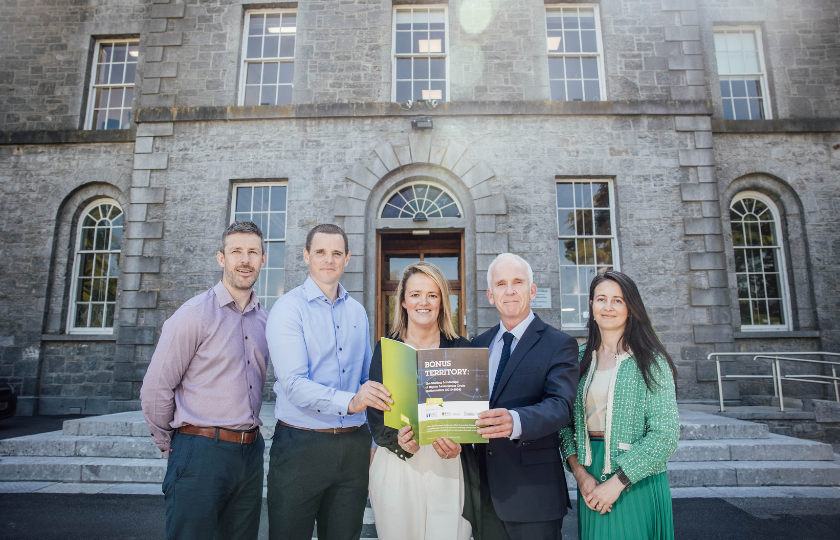
Pictured L-R: Dr Mark Prendergast, School of Education, UCC; Dr Páraic Treacy, School of Education (Post-Primary) at MIC; Dr Niamh O’Meara (EPI•STEM, School of Education, UL), Prof Dermot Nestor, President of MIC; and Prof Jennifer Johnston, Vice Dean MIC Thurles.
The almost 130% increase in students opting to pursue Leaving Certificate Mathematics at Higher Level since 2011 is positive but is also putting more pressure on teachers and may actually be causing standards in mathematics to decline, according to researchers at Mary Immaculate College (MIC), University College Cork (UCC) and University of Limerick (UL).
The authors of Bonus Territory: The Shifting Landscape of Higher Level Senior Cycle Mathematics (2010-2024), Páraic Treacy, School of Education (Post-Primary) at MIC; Mark Prendergast (School of Education, UCC) and Niamh O’Meara (EPI•STEM, School of Education, UL), examined the participation landscape from 2010 to 2024—taking into account the perspectives of math teachers, students and policymakers.
While the last 14 years has seen a 129.7% increase in the proportion of students opting to complete Senior Cycle Mathematics at Higher Level, this marked surge since the Bonus Points Initiative (BPI) was introduced in 2012 with the aim of increasing the uptake of Higher mathematics and the long-term goal of improving students’ mathematical skills may not have had the intended effect of the latter goal. The report found that many students might previously have opted for Ordinary Level examination, leading to wider ranges of attainment in the classroom.
Bonus points are cited by most students in the research as the key reason for choosing Higher Level mathematics so the potential 25 point CAO boost on offer is the appeal as opposed to the love or challenge of mathematics.
Meanwhile, teachers are under pressure to properly support the growing attainment gaps they are encountering in the classroom and in need of further support and professional development. Educators also expressed concerns that opportunities to engage in more challenging material are limited and, as a result, worry that higher achieving students may not be challenged sufficiently.
With the significant growth and transformation in a typical Higher Level Senior Cycle mathematics cohort, maintaining relatively similar proportions of students achieving at each grade has led to a greater number of students achieving grades at the upper end when compared to previous cohorts. Therefore, it has become less of a challenge to achieve higher grades and, thus, standards in mathematics appear to have declined as a result.
Drs Treacy, Prendergast and O’Meara commented: “This report is the culmination of six years of research examining the impact of bonus points on Senior Cycle mathematics students and teachers, as well as the wider implications for the education system in Ireland. It is a complex issue which has led to some very interesting findings beyond the surface level effect bonus points has had on participation in Higher Level Senior Cycle mathematics. This report gives us a clearer picture of the totality of the impact of bonus points and outlines evidence-informed action which should be taken in light of these findings."
Prof. Geraldine Mooney Simmie, Director of EPI•STEM, the National Centre for STEM Education in UL, called the report “detailed and timely” in her preface.
“The insights and evidence from this study will be of great interest to a wide number of policymakers, and will help to shape a futures-oriented view of the important role of Mathematics Education and STEM Education in a fast-changing world. In a highly technological and scientific world there are multiple purposes at individual, societal, economic and environmental levels for achieving success in advanced mathematics. While identification of the talent pool for assuring a thriving economy and for national security are well rehearsed, of equal importance today is the successful development of an equitable, well-educated and sustainable society and environment.”
Ahead of the launch of the report at the MIC Thurles campus on 16 May, President of MIC, Prof. Dermot Nestor added: “I am delighted that MIC is one of the institutions involved in this valuable research. Mathematics plays a critical role not just in our education system, but in preparing students for life in a technologically orientated and data-driven world. Over the past decade and a half, we have seen a striking increase in the number of students taking Higher Level Mathematics at Senior Cycle—a trend that deserves celebration, but also careful reflection in terms of alignment between incentives, supports, and benefits. This report provides us with a carefully considered assessment of the evolving landscapes we simultaneously occupy, and points us towards the inherent value of responsible, evidence-informed action.”



